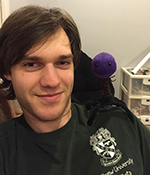
| B.A., 2014, Biochemistry and Molecular Biology, Drew University, Madison, NJ Advisor: Bruce Futcher Email: Steven.Ketchum@stonybrook.edu |
| Research Interests | My research concerns development of a new technique for viral vaccine creation, namely the attenuation of viruses via codon pair bias. Codon pair bias is a well-documented but poorly understood phenomenon in which cells prefer to use certain pairs of codons much more frequently and others much less frequently than expected by chance within coding regions. If one artificially creates genes with high numbers of very uncommon codon pairs (“deoptimizing” those genes), mRNA levels are reduced, and translation of the remaining mRNAs transcripts is slowed. Consequently, protein production is significantly reduced (Gardin et al. In review). In collaboration with the Wimmer lab, we have shown that deoptimizing viral genes can effectively attenuate viruses for use in vaccines (Coleman et al. 2008). However, the mechanism by which unfavorable codon pair bias reduces gene expression is unknown. We use a yeast model system expressing deoptimized LYS2 or HIS3 genes. Severely deoptimized LYS2 or HIS3 genes are nonfunctional (i.e., Lys- or His-). Therefore, strong selection can be applied to find mutations suppressing codon pair deoptimization, and returning phenotypes to Lys+ or His+. By identifying such suppressors, we hope to find the mechanisms affecting the mRNA processing and translation of codon pair deoptimized genes. This may reveal hitherto unsuspected pathways, and may enhance the effectiveness and safety of codon pair deoptimized viral vaccines. |
| Awards | 2019 Distinguished Service Award, Department of Microbiology and Immunology, Stony Brook University, Stony Brook, NY Graduate Student Association Resource Action Project Grant to attend the EQUALS Excellence and Quality in Academic Life in STEM Conference. May 11-12, 2017, University of Waterloo, Ontario, Canada. |
| Publications | Zhou, J., Li, J., Serafim, R.B., Ketchum, S., Ferreira, C.G., Liu, J.C., Coe, K.A., Price, B.D., and Yusufzai, T. (2018). Human CHD1 is required for early DNA-damage signaling and is uniquely regulated by its N terminus. Nucleic Acids Research 46:3891–3905. |